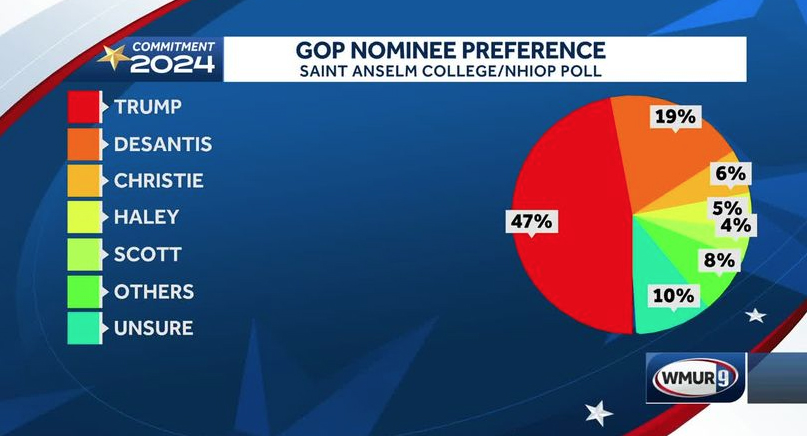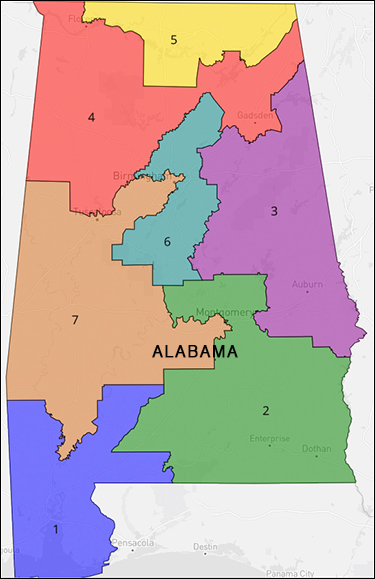By Jim Ellis — Monday, Jan. 8, 2024
Several states have been conducting a second round of redistricting, and four have completed the process. Therefore, the group has new maps in place for the 2024 election cycle. Below is a redistricting recap:Completed States
Alabama: The US Supreme Court rather surprisingly sided with the Democratic plaintiffs to force a redraw of the Alabama congressional map under the reasoning that a second majority minority seat could be drawn. The new map results in a pairing of Republican Congressmen Jerry Carl (R-Mobile) and Barry Moore (R-Enterprise) in a southern Alabama district that stretches from Mississippi to Georgia along the Gulf Coast and Florida border.
The Republican primary election, scheduled for March 5, will decide who represents this district likely for the remainder of the decade. Rep. Carl represents 59 percent of the new district while Rep. Moore overlaps with 41 percent of the new AL-1 territory. Since Carl and Moore are the only Republican candidates, no runoff election will be necessary.
As a result of the reconfiguration, a new Montgomery/Mobile-anchored 2nd District was designed to elect an African American. A total of 13 Democrats and eight Republicans are running for the new seat. Expect runoff elections to occur for both parties. The runoff election date is April 2. Democrats are expected to gain a net of one seat under the new court ordered map.
Georgia: The new Georgia congressional plan was completed and received court approval during the Christmas break. The court previously ruled that the plan should be drawn to create another majority minority district. The legislature and governor complied with the ruling in that they converted a racial coalition district into a majority minority seat. Rep. Lucy McBath (D-Marietta) is moving from her current 7th District that lies east of Atlanta back to a more western suburban seat that is closer to the district from which she was originally elected. She should have little trouble winning the new 6th District.
Conversely, current 6th District Congressman Rich McCormick (R-Suwanee) will run in the new 7th CD that is Republican favorable. Therefore, expect no change in the 9R-5D Georgia delegation party division.
New Mexico: Republicans challenged the 3D-0R congressional map as an “excessive gerrymander,” but lost at the district court level. The New Mexico state Supreme Court then rejected the Republican appeal. Therefore, the current map will stand for the 2024 election, and likely throughout the decade.
The state’s 2nd District, while designed to elect a Democrat, is competitive and we can expect to see another tight election contest between freshman Rep. Gabe Vasquez (D-Las Cruces) and former US Rep. Yvette Herrell (R). The 2022 race between the two ended with Vasquez unseating then-Rep. Herrell by less than one percentage point.
North Carolina: Republicans scored a big victory here, as the new map will yield the GOP a net three-seat gain. With Rep. Kathy Manning (D-Greensboro) not seeking re-election, the Democrats are conceding the new 6th District without even fielding a candidate. Six Republicans are vying for the party nomination including former US Rep. Mark Walker and High Point Mayor Jay Wagner.
Rep. Wiley Nickel (D-Cary) foregoing re-election in the new 13th District to run for the Senate in 2026 means the Republicans are a sure bet to convert this seat, too. A total of 14 Republicans have qualified for the ballot in this district.
The new 14th CD is another seat primed to go Republican. Democratic incumbent Jeff Jackson (D-Charlotte) is running for Attorney General, meaning state House Speaker Tim Moore (R-Cleveland County) is becoming the prohibitive favorite to win this district.
The most competitive general election appears to be forming in the state’s 1st District where Democratic freshman Don Davis (D-Snow Hill/Rocky Mount) faces more Republican terrain in his new district. Former congressional nominee Sandy Smith and retired Army Col. Laurie Buckhout are vying for the party nomination. The Dave’s Redistricting App statisticians calculate a new 50.9D – 47.7R partisan lean, meaning the seat now only leans Democratic. Under the previous map, the 1st District partisan lean was factored as 54.1D – 44.4R.
States in Progress
Florida: The Florida congressional map was declared illegal at the district level, but the state Appellate Court overturned the ruling. Therefore, it is likely the current map will stand at least for the 2024 election cycle.
Louisiana: Like Alabama, Louisiana was under court order to redraw their map for purposes of creating another majority minority congressional seat. The court has given the legislature and its new governor, Republican Jeff Landry, until the end of this month to submit a new plan. It is likely that the two most affected Republicans will be Reps. Garret Graves (R-Baton Rouge) and Julia Letlow (R-Start). It is probable that Democrats will gain one seat in the Baton Rouge area once the final plan is completed and adopted.
New York: The New York congressional map has been returned to the New York State Independent Redistricting Commission for a redraw. The new map will require approval from the state legislature. This is the “wild card” plan for the 2024 election cycle. Most believe Democrats will make big gains, and the current map favors the party, yet their candidates could not deliver what was expected in 2022. Should some of the districts be made more Democratic, other marginal seats in the adjacent areas could become more Republican.
The areas most likely to be affected are Long Island, Brooklyn/Manhattan, the Hudson Valley, and the upstate area in and around Syracuse. Expect Democratic gains once the process is complete, but it is difficult to project just how many.
South Carolina: The US Supreme Court has heard oral arguments on a lawsuit challenging the 1st District (Rep. Nancy Mace-R) as a racial gerrymander. The high court ruling is pending. A decision for the plaintiffs could mean the loss of one Republican seat. Rejecting their claim would mean the current 6R-1D delegation map will likely stand throughout the remainder of the decade.
Wisconsin: During the Christmas break, the state Supreme Court ordered a redraw of the state Senate and Assembly boundaries but did not rule on the congressional map. Most expect the court to order a federal reconfiguration as well, but time is growing short. The Secretary of State has informed the court that new maps will have to be in place before March 15 in order to conduct 2024 elections. A new congressional map would likely mean a net gain of at least one seat for the Democrats.






